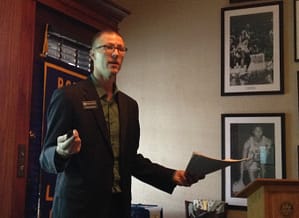 The Kansas Bar Association’s Young Lawyers Section and the National Association of Women Judges have partnered together to put together a series of presentations called the “Informed Voters Project”.
The Kansas Bar Association’s Young Lawyers Section and the National Association of Women Judges have partnered together to put together a series of presentations called the “Informed Voters Project”.
Nathan Eberline who is the Associate Legislative Director & Legal Counsel at the Kansas Association of Counties spoke to Lawrence Central about the need for an independent judiciary and a knowledgeable electorate. The presentation was nonpartisan and apolitical (though judicial retention in Kansas has been a campaign issue and judicial appointments have increasingly been part of the legislative debate).
The current State Supreme and Appellate judicial branches in Kansas appoint differently.
The members of the State Supreme Court Nominating Commission are:
- Four laypersons selected by the Governor, one from each of the four Congressional Districts
- Four lawyers, one from each of the four Congressional districts, elected by the lawyers in their districts
- One chairperson, a lawyer elected by lawyers statewide
The Kansas Bar Association has no role in the selection of lawyer members or the chair of the Supreme Court Nominating Commission
While until 2013, selection method for appellate court judges was identical to the merit system used for appointments to the Supreme Court. But the process established by statute, not the constitution and a new process passed by the legislature and signed by the Governor eliminated merit screening by a nominating commission. Now Governor selects and Senate confirms.
The whole idea of an independent judiciary is because laws passed are based on the needs/desires of their constituents or voters, their own beliefs, or their political party’s agenda. These laws must be interpreted and should not be influenced by politics, special interest groups, money, public opinion or their own personal beliefs.
Is most cases the only way to unseat a judge is for an informed electorate to vote them out and have new appointments.
That is what the Kansas Judicial Review Survey website is for. It compiles surveys of attorneys, lay people, court staff, and other judges about all appellate judges up for retention in Kansas.
As Eberline put it. “The most important thing is to stay informed. Not about making a statement. It’s about maintaining a system that allows our republic to flourish.”
For more information on this project you can visit their website at www.KansasJudgeReview.org